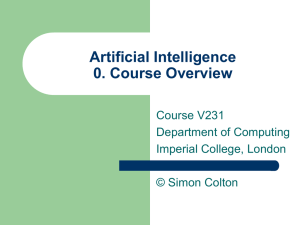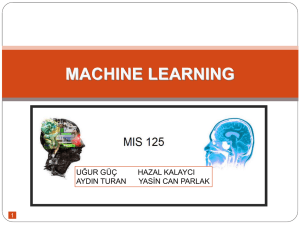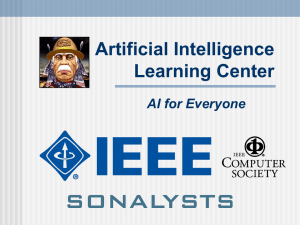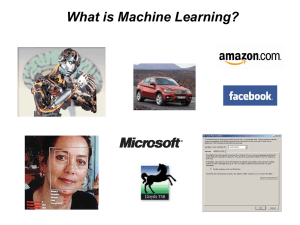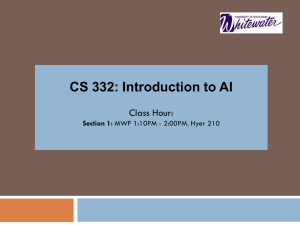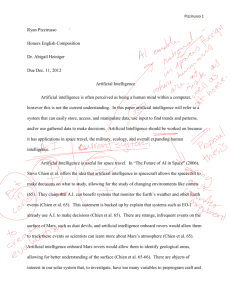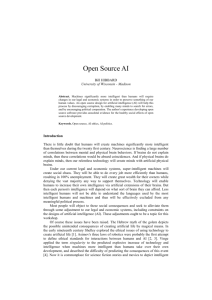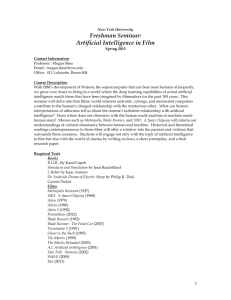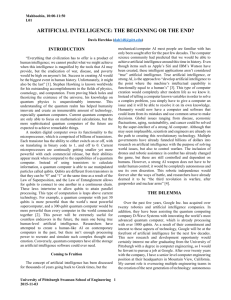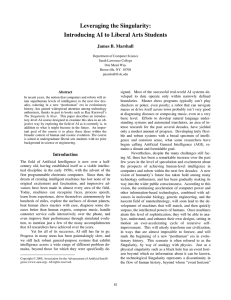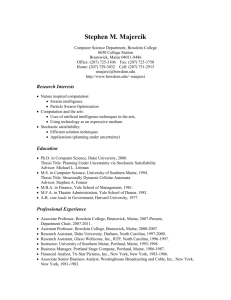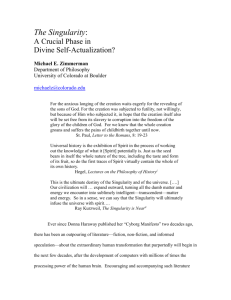Week17_presentation Topic
advertisement
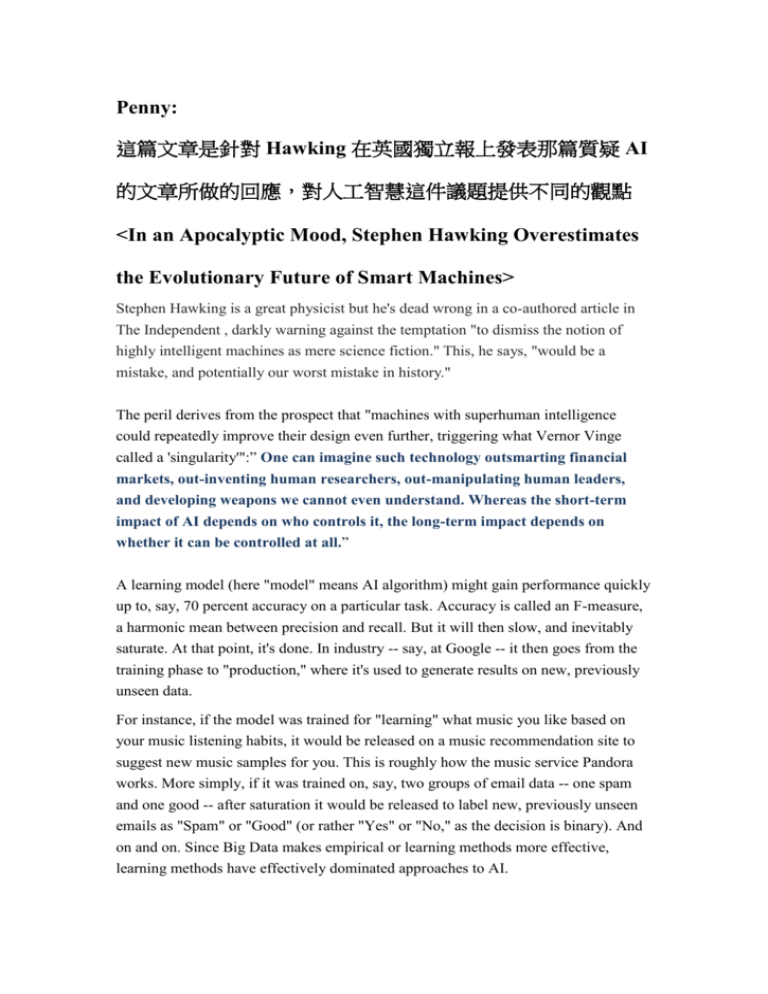
Penny: 這篇文章是針對 Hawking 在英國獨立報上發表那篇質疑 AI 的文章所做的回應,對人工智慧這件議題提供不同的觀點 <In an Apocalyptic Mood, Stephen Hawking Overestimates the Evolutionary Future of Smart Machines> Stephen Hawking is a great physicist but he's dead wrong in a co-authored article in The Independent , darkly warning against the temptation "to dismiss the notion of highly intelligent machines as mere science fiction." This, he says, "would be a mistake, and potentially our worst mistake in history." The peril derives from the prospect that "machines with superhuman intelligence could repeatedly improve their design even further, triggering what Vernor Vinge called a 'singularity'":” One can imagine such technology outsmarting financial markets, out-inventing human researchers, out-manipulating human leaders, and developing weapons we cannot even understand. Whereas the short-term impact of AI depends on who controls it, the long-term impact depends on whether it can be controlled at all.” A learning model (here "model" means AI algorithm) might gain performance quickly up to, say, 70 percent accuracy on a particular task. Accuracy is called an F-measure, a harmonic mean between precision and recall. But it will then slow, and inevitably saturate. At that point, it's done. In industry -- say, at Google -- it then goes from the training phase to "production," where it's used to generate results on new, previously unseen data. For instance, if the model was trained for "learning" what music you like based on your music listening habits, it would be released on a music recommendation site to suggest new music samples for you. This is roughly how the music service Pandora works. More simply, if it was trained on, say, two groups of email data -- one spam and one good -- after saturation it would be released to label new, previously unseen emails as "Spam" or "Good" (or rather "Yes" or "No," as the decision is binary). And on and on. Since Big Data makes empirical or learning methods more effective, learning methods have effectively dominated approaches to AI. There is a confusion, then, at the heart of the vision that Stephen Hawking has somewhat oddly endorsed. Adding more data won't help these learning problems -performance can even go down. This tells you something about the prospects for the continual "evolution" of smart machines. Facebook, meanwhile, has hired NYU computer scientist Yann LeCunn to head their new AI Lab. LeCunn spearheads a machine learning approach known as "Deep Learning." ATMs already use LeCunn's methods to automatically read checks. Facebook hopes his approach will help the company automatically read images in photos posted on the site, like pictures of married couples, or pets. Futurist and entrepreneur Ray Kurzweil, currently Director of Engineering at Google, popularized the notion of a coming "singularity" discussed in the Independent article. He made his fortune designing and patenting speech-to-text synthesizers, and helped design Apple's voice recognition system, Siri. Indeed, the examples mentioned in the article -- self-driving cars, Google Now, Siri -- were all made possible by the application of fairly well-known learning algorithms (for example, Hidden Markov Models for voice recognition) that have had new life breathed into them (so to speak) by the availability of massive datasets, the terabytes of text and image data on the Web. An unfortunate product of hype about AI is the concession to what Kurzweil himself has called "Narrow" AI: the abandonment of the original goals of Artificial Intelligence to actually understand human thinking, focusing instead on big money applications that tell us little about the mind. While Kurzweil views this as a stepping stone toward the eventual Singularity, as all those "narrow" AI applications like recognizing a photo of a wedding picture "scale up" to genuine, real-time intelligence, a more direct and evidence-based conclusion is that AI is in a bubble, and as the Big Data methods saturate, excitement will crash and result in a hangover. That's exactly what happened in the 1960s with early efforts on natural language understanding, and later in the 1980s with the failure of so-called expert systems. AI is a tough racket; the human mind isn't a computer program, it seems, though there's never a dearth of people happy to promulgate this view. http://www.evolutionnews.org/2014/05/in_an_apocalypt085311.html 姜岑: 計算機科學家預測 2045 年人工智能將超越人腦 http://big5.ts.cn/special/xjkxxw/2011-02/22/content_5609400.htm 什麼是人工智慧 http://scitechvista.most.gov.tw/zh-tw/Articles/C/0/9/10/1/1548.htm 人工智慧 AI http://lingb28.myweb.hinet.net/b9091199/AI.htm 人工智慧原理與意義 http://content.edu.tw/senior/computer/ks_ks/et/ai/chap1/ 人工智慧春天來了!微軟開發隱形使用者介面 http://news.cnyes.com/Content/20140408/KIUSGD8J2CFWS.shtml Definition - What does Artificial Intelligence (AI) mean? Artificial intelligence (AI) is an area of computer science that emphasizes the creation of intelligent machines that work and react like humans. Some of the activities computers with artificial intelligence are designed for include: Speech recognition Learning Planning Problem solving Artificial intelligence is a branch of computer science that aims to create intelligent machines. It has become an essential part of the technology industry. Research associated with artificial intelligence is highly technical and specialized. The core problems of artificial intelligence include programming computers for certain traits such as: Knowledge Reasoning Problem solving Perception Learning Planning Ability to manipulate and move objects Applications of AI Q. What are the applications of AI? A. Here are some. game playing You can buy machines that can play master level chess for a few hundred dollars. There is some AI in them, but they play well against people mainly through brute force computation--looking at hundreds of thousands of positions. To beat a world champion by brute force and known reliable heuristics requires being able to look at 200 million positions per second. speech recognition In the 1990s, computer speech recognition reached a practical level for limited purposes. Thus United Airlines has replaced its keyboard tree for flight information by a system using speech recognition of flight numbers and city names. It is quite convenient. On the the other hand, while it is possible to instruct some computers using speech, most users have gone back to the keyboard and the mouse as still more convenient. understanding natural language Just getting a sequence of words into a computer is not enough. Parsing sentences is not enough either. The computer has to be provided with an understanding of the domain the text is about, and this is presently possible only for very limited domains. computer vision The world is composed of three-dimensional objects, but the inputs to the human eye and computers' TV cameras are two dimensional. Some useful programs can work solely in two dimensions, but full computer vision requires partial three-dimensional information that is not just a set of two-dimensional views. At present there are only limited ways of representing three-dimensional information directly, and they are not as good as what humans evidently use. expert systems A ``knowledge engineer'' interviews experts in a certain domain and tries to embody their knowledge in a computer program for carrying out some task. How well this works depends on whether the intellectual mechanisms required for the task are within the present state of AI. When this turned out not to be so, there were many disappointing results. One of the first expert systems was MYCIN in 1974, which diagnosed bacterial infections of the blood and suggested treatments. It did better than medical students or practicing doctors, provided its limitations were observed. Namely, its ontology included bacteria, symptoms, and treatments and did not include patients, doctors, hospitals, death, recovery, and events occurring in time. Its interactions depended on a single patient being considered. Since the experts consulted by the knowledge engineers knew about patients, doctors, death, recovery, etc., it is clear that the knowledge engineers forced what the experts told them into a predetermined framework. In the present state of AI, this has to be true. The usefulness of current expert systems depends on their users having common sense. heuristic classification One of the most feasible kinds of expert system given the present knowledge of AI is to put some information in one of a fixed set of categories using several sources of information. An example is advising whether to accept a proposed credit card purchase. Information is available about the owner of the credit card, his record of payment and also about the item he is buying and about the establishment from which he is buying it (e.g., about whether there have been previous credit card frauds at this establishment). Future/Ethics of artificial intelligence Roboethics Robot rights The threat to privacy The threat to human dignity Machine ethics Unintended consequences Many researchers have argued that, by way of an "intelligence explosion" sometime in the next century, a self-improving AI could become so vastly more powerful than humans that we would not be able to stop it from achieving its goals.

